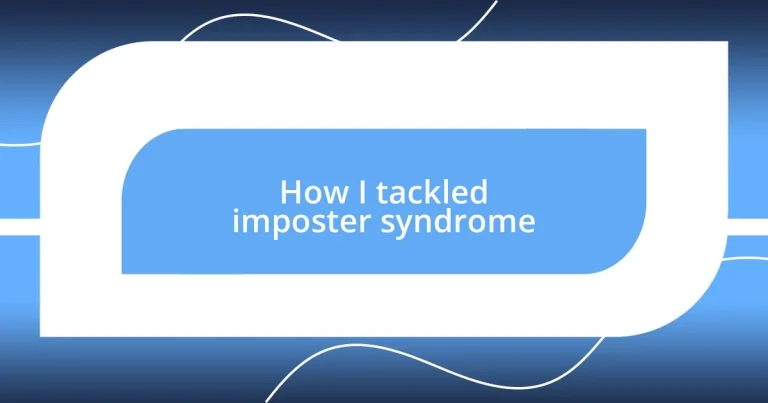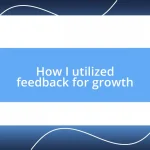Key takeaways:
- Identifying personal triggers and symptoms of imposter syndrome, such as comparison and negative self-talk, is crucial for managing feelings of inadequacy.
- Challenging negative thoughts through reframing, journaling, and seeking support from mentors can significantly enhance self-confidence and combat self-doubt.
- Actively celebrating achievements, both big and small, transforms perspectives on success and failure, fostering a supportive environment and personal growth.
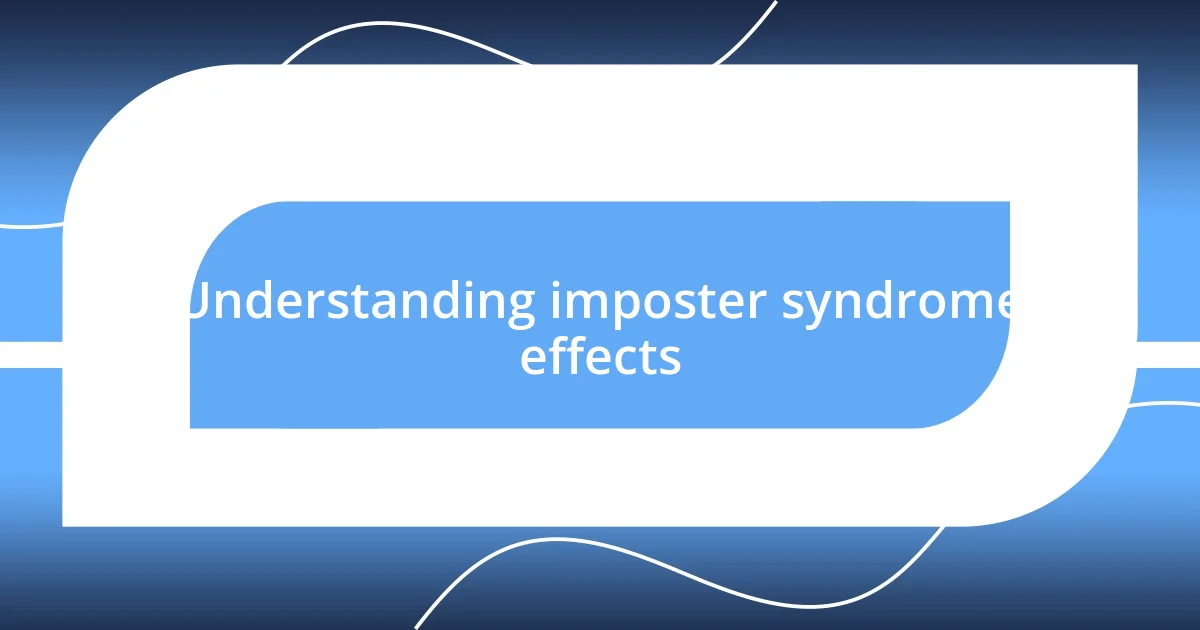
Understanding imposter syndrome effects
Imposter syndrome can manifest in various ways, affecting both our mental health and professional performance. I remember times when I’d achieve a significant milestone at work, and instead of celebrating, I felt a deep-seated fear of being “found out.” The emotional toll of second-guessing my capabilities led me to wonder, “Do others feel this way too?”
One of the most debilitating effects is the constant comparison to others. I often found myself scrolling through social media, comparing my journey to seemingly flawless success stories of my peers. It left me wondering—are they really that confident, or are they just better at hiding their own doubts?
Ultimately, imposter syndrome fosters a cycle of anxiety and self-doubt that can be hard to break. In my experience, grappling with feelings of inadequacy contributed to burnout, causing me to overwork just to “prove” my worth. Isn’t it peculiar how we can be our own harshest critics, even when there’s objective evidence of our achievements?
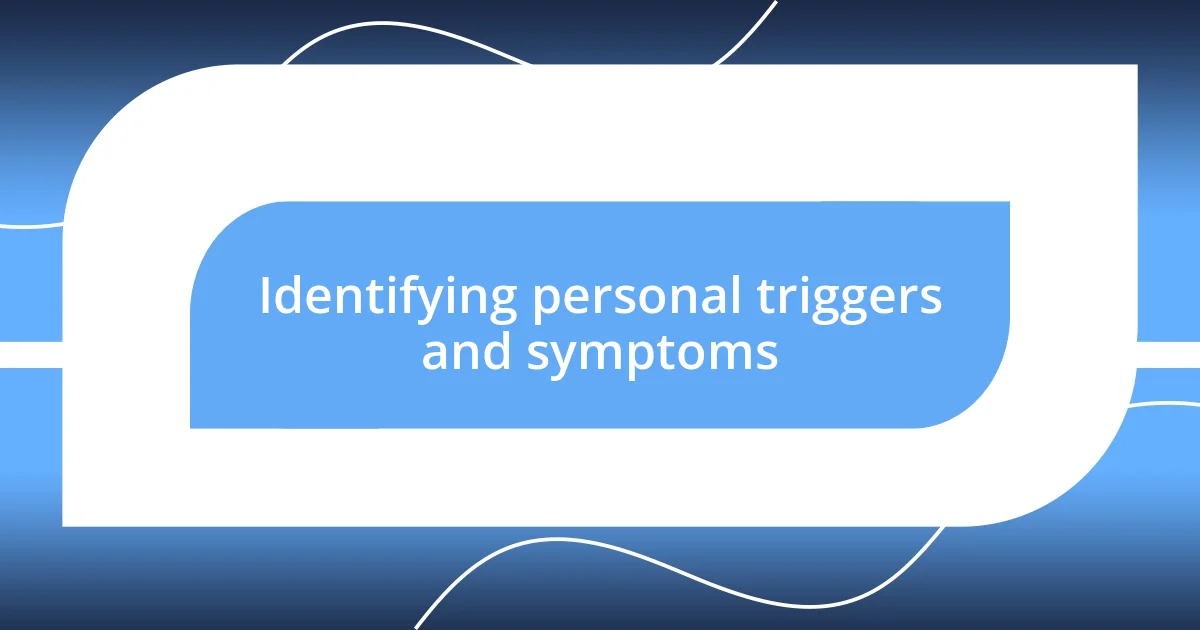
Identifying personal triggers and symptoms
Identifying my personal triggers for imposter syndrome was an eye-opening journey. I realized certain situations, like team presentations or networking events, heightened my feelings of inadequacy. I’d often feel my heart race and hands get clammy before speaking up. Recognizing these physical symptoms was my first step toward managing them effectively.
Here are some common triggers and symptoms I’ve encountered:
– Comparison: Social media often escalates feelings of self-doubt.
– Perfectionism: An overwhelming desire for everything to be flawless leads to fear of failure.
– New challenges: Stepping out of my comfort zone ignites anxiety about not meeting expectations.
– Negative self-talk: Phrases like “I don’t belong here” echo in my mind, undermining my confidence.
– Feedback sensitivity: Critiques, even constructive ones, can feel personal and amplify doubts.
By acknowledging these triggers, I started to prepare for them mentally. Understanding when and why I felt this way made a significant difference in how I approached challenges, paving the way for personal growth.
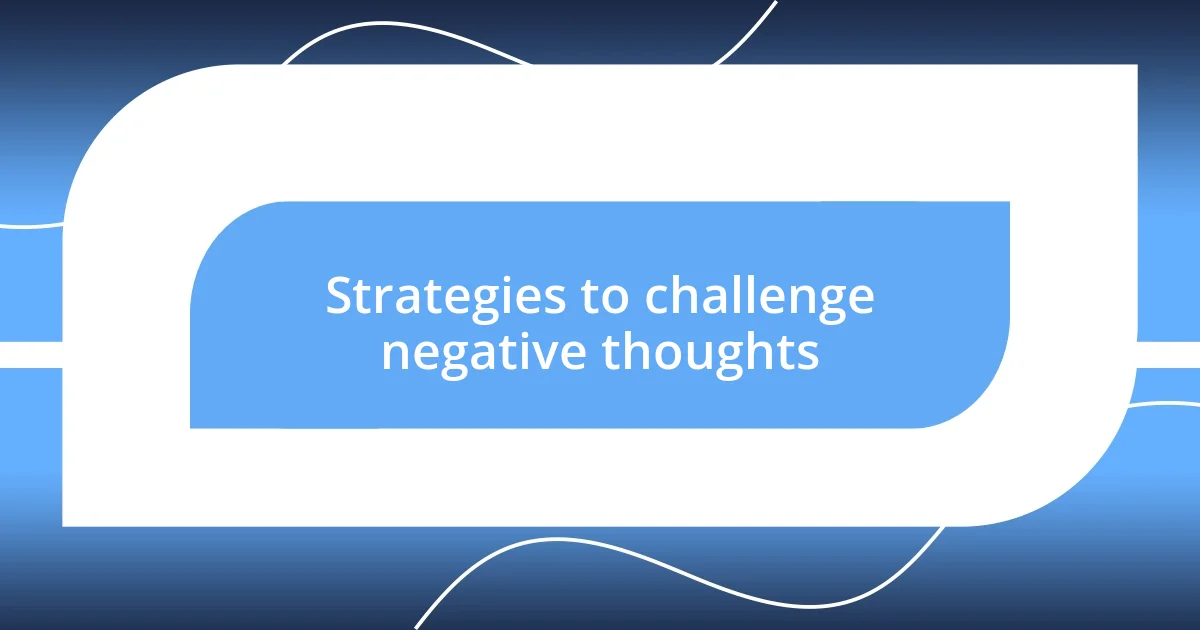
Strategies to challenge negative thoughts
Recognizing and challenging negative thoughts is essential in tackling imposter syndrome. I discovered that reframing my thoughts could shift my perspective in a powerful way. For instance, instead of thinking, “I’m not good enough for this role,” I started telling myself, “I earned this opportunity through hard work and dedication.” This subtle shift grounded my confidence in reality rather than self-doubt, showing me that my achievements were valid.
Journaling became another strategy for me. I made it a habit to write down instances where I felt like a fraud and then counter those feelings with evidence of my successes. This practice of documenting both negative and positive thoughts created a tangible reflection of my journey. On challenging days, flipping through those pages served as a reminder of my capabilities, reinforcing the idea that many of my perceived shortcomings were mere illusions crafted by my insecurities.
Moreover, seeking external validation through supportive relationships has been invaluable. I remember talking to a trusted mentor about my feelings of self-doubt. Their encouragement helped me see the discrepancies between my thoughts and the reality of my accomplishments. Engaging in honest dialogue not only alleviated my fears but also provided insights that I might not have recognized on my own.
| Strategy | Description |
|---|---|
| Thought Reframing | Transforming negative thoughts into positive affirmations to build self-confidence. |
| Journaling | Writing down feelings and successes to create a documented contrast to negative self-perception. |
| Seeking Support | Communicating with mentors or friends to gain perspective and emotional support. |
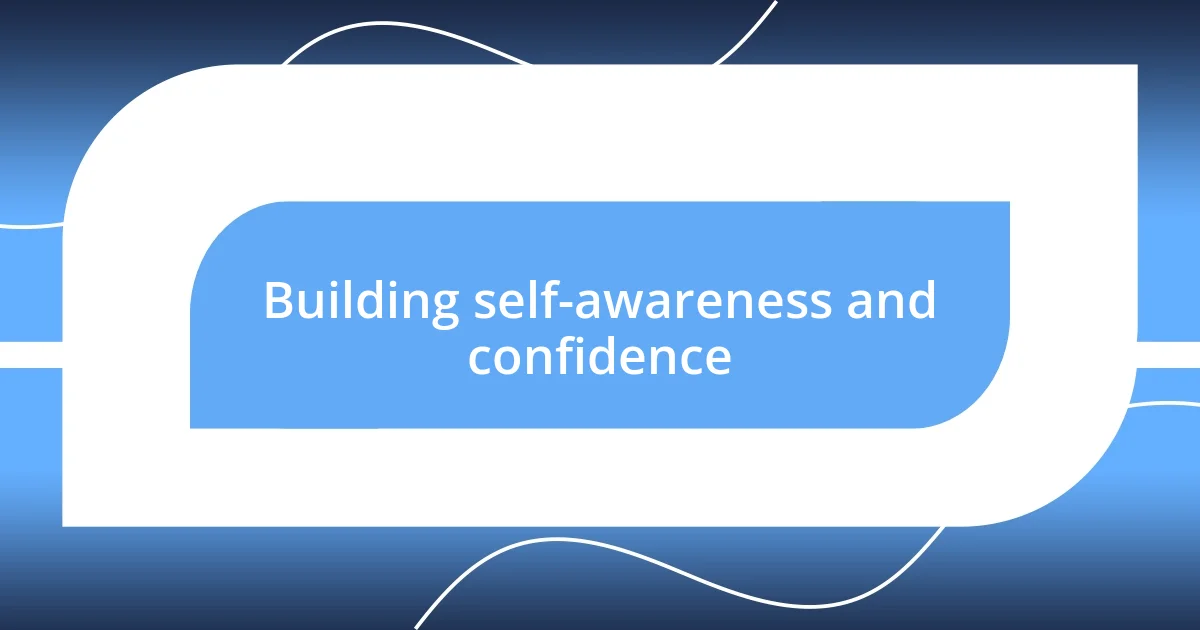
Building self-awareness and confidence
Building self-awareness is a crucial step in overcoming imposter syndrome. I often found myself reflecting on moments when I felt inadequate, and these reflections helped me pinpoint specific areas where I lacked confidence. For example, after a challenging meeting, I would ask myself, “What triggered that feeling?” This simple question opened doors to greater understanding, revealing that much of my anxiety stemmed from a fear of judgment rather than actual incompetence.
As I delved deeper into self-awareness, I discovered techniques that nurtured my confidence. One memorable exercise involved creating personal affirmations. I’d stand in front of the mirror each morning and remind myself of my strengths and accomplishments. It felt a bit silly at first, but over time, this ritual transformed into a powerful daily mantra that grounded me. I began to notice a shift in my demeanor—I walked taller and spoke more assertively, feeling more aligned with who I truly was.
Engaging in dialogue with myself was another game-changer. I started asking, “What would I tell a friend in my position?” This shift in perspective made it easier to replace harsh criticism with compassion. By treating myself with the same kindness I offered others, I gradually built a more supportive inner voice. Recognizing my achievements, no matter how small, became a vital practice in reinforcing my self-worth. After all, isn’t it fascinating how a little kindness can change our internal narrative?
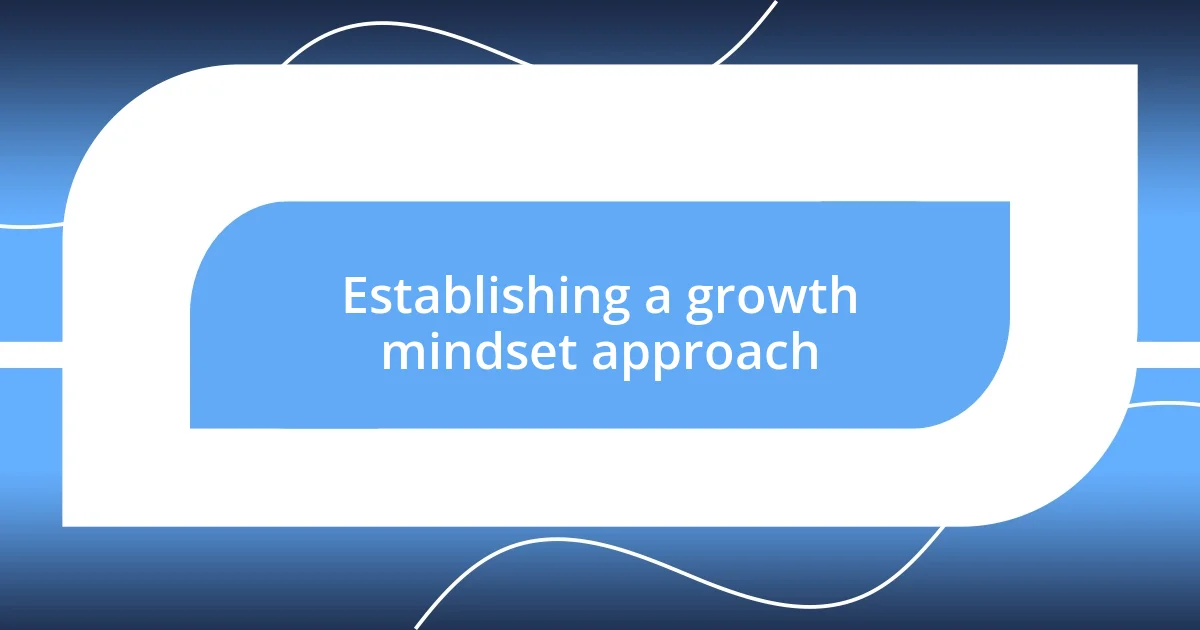
Establishing a growth mindset approach
Adopting a growth mindset was transformative for me in tackling imposter syndrome. I remember when I faced a challenging project that seemed beyond my grasp. Instead of succumbing to doubt, I shifted my approach by asking, “What can I learn from this experience?” This simple reframe empowered me to view challenges as opportunities for growth rather than insurmountable obstacles. Each setback became a stepping stone, reminding me that mastery comes from embracing the journey, not fearing failure.
One particularly enlightening moment came during a workshop on personal development. As the speaker shared insights about how innovative thinkers view setbacks as essential learning experiences, I felt a flicker of recognition. I realized that every time I struggled, it wasn’t evidence of my inadequacy, but rather an opportunity to develop resilience. I started to consciously apply this lesson, shifting my focus from fearing mistakes to celebrating small victories. Have you ever noticed how much progress can emerge from a single moment of bravery?
Challenge became less intimidating when I embraced feedback. Initially, the idea of seeking constructive criticism made my stomach churn. However, when I started to view feedback as a gift rather than a threat, my mindset shifted. I recall asking for input on a presentation I was nervous about. The suggestions I received helped refine my skills, making me feel more equipped for future endeavors. This openness not only muffled my inner critic but also illuminated the path toward becoming a more capable version of myself. Isn’t it empowering to realize that seeking support simultaneously nurtures growth?
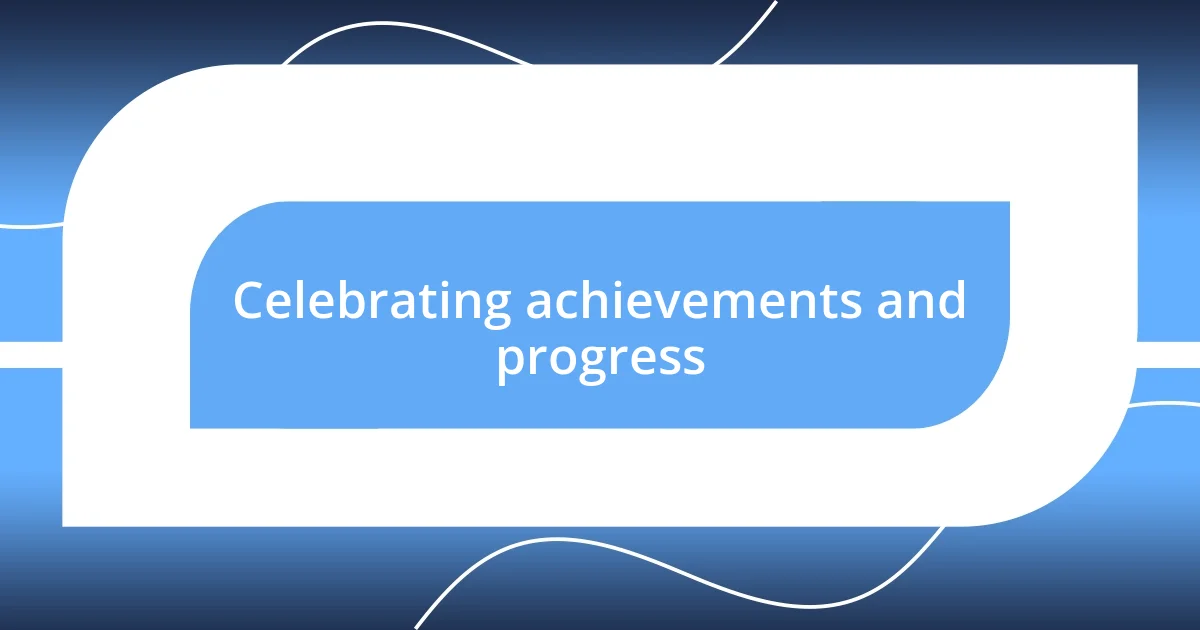
Celebrating achievements and progress
One of the most enlightening moments in my journey was when I began to actively celebrate my achievements, big and small. I set aside time at the end of each week to reflect on what I’d accomplished. For instance, I’d jot down even the tiniest success—like mastering a new skill or navigating a tough conversation—on a sticky note. I remember the first time I looked at that collection of notes; it was a tangible reminder of my capability and progress, which truly lifted my spirits. Isn’t it incredible how something as simple as writing can serve as a beacon of self-affirmation?
As I embraced this practice, I found that celebrating my wins not only boosted my confidence but also helped me shift my perspective on failure. I vividly recall the day I bombed a presentation at work. Instead of wallowing in disappointment, I took a moment to acknowledge my effort. I reminded myself that stepping outside my comfort zone was an achievement in itself. The realization that every stumble could lead to growth was liberating. Have you ever considered how reframing your perception of setbacks can soften the sting of disappointment?
Sharing my successes with colleagues proved to be another rewarding experience. I initiated a monthly gathering where we all talked about our individual wins, no matter how minor. The warmth and encouragement I felt from others reinforced the idea that celebrating progress is crucial for building a supportive environment. I still cherish the bond we formed over shared triumphs, and it’s fascinating to see how celebrating each other’s achievements added a layer of camaraderie among us. It makes me wonder—how much stronger could we all be if we recognized our victories together?












